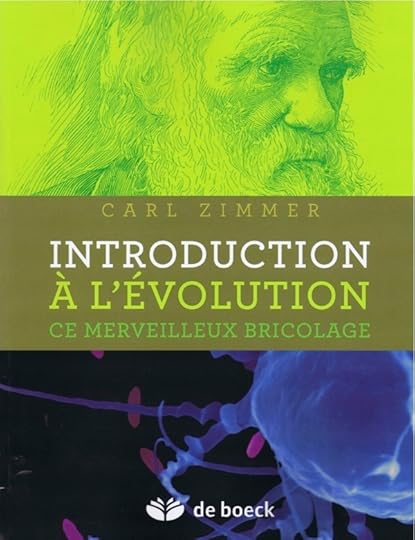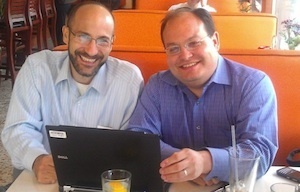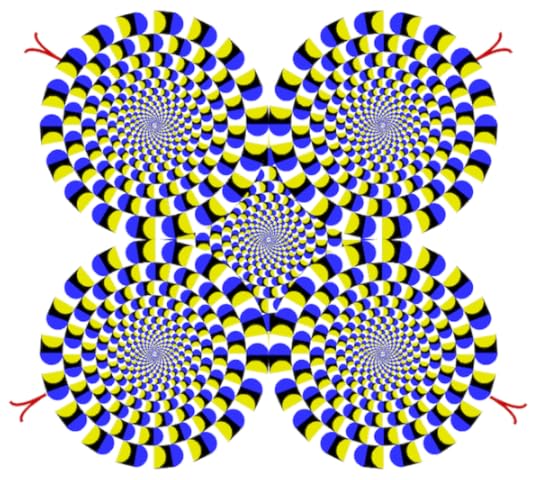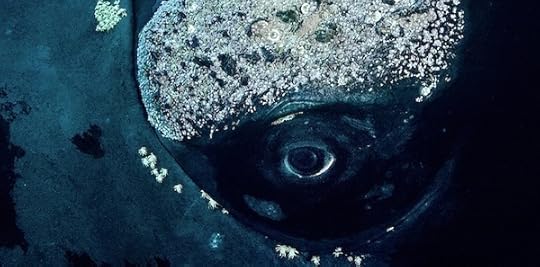Carl Zimmer's Blog, page 45
April 25, 2012
DC and Philly: A Bundle of Talks
I’m heading south to give a series of talks about everything from evolution to science tattoos, the future of journalism, and the mutant bird flu saga. Most of these talks are open to the public. Here’s the rundown, with the public talks noted:
Thursday 11 am: Bethesda, MD: “Telling the Stories of Science in Words and Images.”
National Institute of Diabetes and Digestive and Kidney Diseases Fellows Scientific Retreat.
Thursday 3 pm: Arlington VA: “The Darwin Beat.”
National Science Foundation
Friday 9:30 am: US Science Engineering Festival, Washington DC Convention Center:
I’m part of the festival’s “Nifty Fifty”–speakers who talk to high school students about science. In room 146A, I’ll be giving a sneak peek of my Science Ink talk to a group of students, in advance of the festival, which officially starts on Saturday.
Saturday: US Science and Engineering Festival, Washington DC Convention Center: open to the public
I’ll be speaking twice about Science Ink –both talks are open to the public
10:55 AM-11:40 AM Stage Meeting Room Number: 147AB
Noon to 1: Book signing Expo Hall B
2-2:30 PM National Academy of Sciences Booth 603
Sunday 2pm: Philadelphia : open to the public
Philadelphia Science Festival. I’ll be talking about Science ...

April 24, 2012
How Our Brains Set the World Spinning
If there’s ever excuse to publish an optical illusion as cool as the “Rotating Snakes,” I’ll take it. This illusion was invented in 2003 by Akiyoshi Kitaoka of Ritsumeikan University in Japan, and ever since, Kitaoka and other scientists have been trying to figure out why it works. A new paper by Stephen Macknik at the Barrow Neurological Institute in Phoenix may have the answer.
As you’ll notice, the circles seem to rotate in response to where you look at the illusion. So Macknik and his colleagues tracked the movement of people’s eyes as they gazed at two of these wheels on a computer screen. Their subjects kept a finger pressed on a button, lifting it whenever they seemed to see the wheels move.
Macnick and his colleagues found a tight correlation between the onset of the illusion and a kind of involuntary movement our eyes make, known as microsaccades. Even when we’re staring at a still object, our eyes keep darting around. These movements, called microsaccades, help us compensate for a peculiar property of the eye: if we stare at an object for too long, the signals each photoreceptor sends ...

April 22, 2012
Bricolage and the Tangled Bank: Happy Mistranslations of Evolution

I got back home last night to a pleasant surprise: a copy of the new French translation of The Tangled Bank: An Introduction to Evolution. One of the most interesting parts of writing a book is seeing what emerges from the mind of your translator. I’ve usually had good luck with translators. We’ll exchange emails to find a way to capture the spirit of sentences in my books that would make no sense in another language, thanks to the odd figures of speech we use in English. When the book actually arrives, I usually can do little more than hope that it makes sense in Korean or Japanese or Dutch.
Once in a while, however, things don’t go well, though. I once got a disturbing email from a German reader, who had read the original edition of Parasite Rex and then picked up the German translation. “Believe me, I have never seen something like this before. It is a sin. If you could read it, you would get tears in your eyes.” (Fortunately, my American publisher was able to use his email as a cudgel, and got that edition ...

April 18, 2012
Brains, Genes, and You: My Discover column on the Duke Neurogenetics Study
I’ve got a new column in Discover on a scientist tracing the links from our genes to our personality. Here’s how it starts:
Ahmad Hariri stands in a dim room at the Duke University Medical Center, watching his experiment unfold. There are five computer monitors spread out before him. On one screen, a giant eye jerks its gaze from one corner to another. On a second, three female faces project terror, only to vanish as three more female faces, this time devoid of emotion, pop up instead. A giant window above the monitors looks into a darkened room illuminated only by the curve of light from the interior of a powerful functional magnetic resonance imaging (fMRI) scanner. A Duke undergraduate—we’ll call him Ross—is lying in the tube of the scanner. He’s looking into his own monitor, where he can observe pictures as the apparatus tracks his eye movements and the blood oxygen levels in his brain.
Ross has just come to the end of an hour-long brain scanning session. One of Hariri’s graduate students, Yuliya Nikolova, speaks into a microphone. “Okay, we’re done,” she says. Ross emerges from the machine, pulls his sweater over his head, and signs ...

Fresh Air interview: links to information on viruses, antivirals, the microbiome, and more
Yesterday my Fresh Air interview was broadcast. You can listen to it here. I’ve been lots of emails with follow-up questions, and it occurred to me that I really ought to gather up some links to more information about the topics I discussed.
If I haven’t addressed a question you had listening to the show, leave a comment to this post and I’ll add a link.
Antivirals:
My feature in Wired on the search for antiviral drugs
The “virome”–the viruses that live in our body:
A Loom post about the swarms of viruses in the mouth, where they kill off bacteria
An article in Nature about a study of the viruses in identical twins
The microbiome
My article in the New York Times
My essay on the Loom about medical ecology
My Wired atlas of the human ecosystem
An example of microbiome research: extreme navel gazing
Maryn McKenna’s story in Scientific American on the struggle to mainstream fecal transplants to treat deadly infections
Ed Yong’s oeuvre on the microbiome at Not Exactly Rocket Science
Mayrn McKenna on her blog at Wired writing on the link between beneficial ...

April 17, 2012
Retraction Watch in the Boston Globe: Make Science More Transparent
 As I blogged yesterday, I have a story in the New York Times today about some scientists who are calling for a reformation of science, pointing to troubling indicators such as the rise in retractions of scientific papers.
As I blogged yesterday, I have a story in the New York Times today about some scientists who are calling for a reformation of science, pointing to troubling indicators such as the rise in retractions of scientific papers.
As any sane journalist would do, I consulted the fantastic Retraction Watch, written by Adam Marcus (left) and Ivan Oransky, while working on my own piece. I also called Oransky for his thoughts on the argument I was describing, championed by, among others, Ferric Fang of the University of Washington and Arturo Casadevall of Albert Einstein College of Medicine.
Oransky was a huge help. But by the time my editor and I had shaped the story to fit in the paper, only a brief mention and a link to Retraction remained. Oransky’s own opinions were left behind on the cutting room floor. Fortunately, he knows that floor very well, having swung the journalism scimitar plenty of times himself as the executive editor at Reuters Health.
Even more fortunately, the Boston Globe has published some extended reflections from Oransky and Marcus on what retractions mean for the state of science.

April 16, 2012
Dysfunctional science: My story in tomorrow’s New York Times
In tomorrow’s New York Times, I’ve got a long story about a growing sense among scientists that science itself is getting dysfunctional. For them, the clearest sign of this dysfunction is the growing rate of retractions of scientific papers, either due to errors or due to misconduct. But retractions represent just the most obvious symptom of deep institutional problems with how science is done these days–how projects get funded, how scientists find jobs, and how they keep labs up and running.
Along with the main story, I also wrote a sidebar about how hard it is to hear from the scientists who write retracted papers. I also spoke on the latest Timescast video, which I’ve embedded below. I show up with Arturo Casadevall at about 4:30. There are also lots of links in my story to the original papers. And if you don’t already read it, be sure to check out the blog Retraction Watch, which has been digging deep into the retraction story for years now.

Heads up: Appearing on Fresh Air tomorrow on NPR
Recently I talked with Dave Davies, guest host on Fresh Air, about viruses and other things invisible. Our conversation airs tomorrow (Tuesday 4/17) on National Public Radio. More details can be found on the program’s web site.

Monet’s Ultraviolet Eye and other Ebook Epiphanies: Catching Up With Download the Universe
 Over at Download the Universe, we’ve posted a bunch of new reviews of science ebooks. We fell in love with some titles, we hated others, and we had a love-hate relationship with ebooks that were great in some ways and awful in others. When we started Download the Universe, we thought we were coming together to start something pretty straightforward: a book review dedicated to a neglected category of creations–namely, science ebooks. But ebooks are in such an early stage that our reviews often end up being contemplations of the form itself. In 10 years, I wonder if these questions will be sorted out, or if a new raft of questions will float in to take their place.
Over at Download the Universe, we’ve posted a bunch of new reviews of science ebooks. We fell in love with some titles, we hated others, and we had a love-hate relationship with ebooks that were great in some ways and awful in others. When we started Download the Universe, we thought we were coming together to start something pretty straightforward: a book review dedicated to a neglected category of creations–namely, science ebooks. But ebooks are in such an early stage that our reviews often end up being contemplations of the form itself. In 10 years, I wonder if these questions will be sorted out, or if a new raft of questions will float in to take their place.
Here are the reviews we’ve published since I last posted an update on the Loom, in reverse order:
Monet’s Ultraviolet Eye My review of an app about color, and some thoughts on what ebook designers can learn from museum exhibits
A Disorganized Celebration of Skulls Brian Switek reviews an ebook about the box of bones on top of our spines
Blowing Windmills and Seeing the Future: Al Gore’s Our Choice Dan Fagin reviews Gore’s ebook about energy and climate
April 10, 2012
Living In Alien Worlds: Scientists Discussing The Inner Lives of Animals This Friday
A New York organization called Thinking Animals has launched a fascinating series of scientific talks about animal cognition. I'm looking forward to being the moderator of this Friday's event, called "Living in Alien Worlds."
Four scientists will talk about how the bizarre senses of other animals give them experiences of the world we can barely imagine. We'll be talking about everything from insect to whales.
Here are the details…
Living in Alien Worlds
Friday, April 13, 2012 | 7:00 PM – 9:00 PM
Hunter College West, Lexington Ave. and 68th St., Room 714
Panelists include: Jelle Atema, Tim Goldsmith, Katy Payne, Stim Wilcox, and moderator Carl Zimmer. Here are the speaker biographies.
Here's the web site where you can get a ticket.
[Image: Southern Right Whale Eye, Brian Skerry, National Geographic]



























